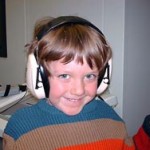Central Auditory Processing Disorder In Children
 Central Auditory Processing Disorder CAPD relates to hearing defects. Hearing of sound involves a large number of functions performed by the ear, as sounds strike the eardrum it undergoes transformations involving change of form of signals. These signals then pass from the ear to various parts of the brain for analysis and recognition.
Central Auditory Processing Disorder CAPD relates to hearing defects. Hearing of sound involves a large number of functions performed by the ear, as sounds strike the eardrum it undergoes transformations involving change of form of signals. These signals then pass from the ear to various parts of the brain for analysis and recognition.
Many persons have no problem in hearing but have other types of auditory/hearing difficulties. They are considered as having no hearing difficulties. The difficulties they experience in certain circumstances are often considered to be the result of an attention deficit or behavior problem or lack of motivation, or some other cause.
CAPD can be classified as a deficiency in any one or more of the behavioral phenomena. There is no one cause of CAPD. In many children it is related to delays in the development of hearing centers within the brain, processing abilities of these children develop as they mature. In other children, the deficits are related to differences in the way the brain develops, such children represent more static types of problems. In some children, the CAPD can be due to any disease may be by trauma, tumors, degenerative disorders, viral infections, surgery, auditory deprivation etc. This problem often co-exists with other disabilities like speech and language disorders or delays, learning disabilities, attention deficit disorders etc.
Some of the common behavioral characteristics noted in children with CAPD are difficulty in hearing in noise, or on telephone or understanding long talk, or learning vocabulary or new language including speaking such language or words. Remember that many of these characteristics are not unique to CAPD. Therefore, one should not necessarily assume that the presence of any one or more of these characteristics indicates that the child has a CAPD. However, if any of these behaviors are noted, the child should be got testing to rule out this problem.
A number of checklists have been developed in an effort to systematically probe for behaviors that may suggest a CAPD. Some of these are for teachers, while others are for parents. These can help in determining whether a child should be referred to an audiologist for a central auditory processing assessment.
Under two major categories there are a number of tests that the audiologist can perform to assess central auditory function. They are behavioral tests and electro-physiologic tests. Electrophysiological tests are measures of the brain’s response to sounds. The results obtained on these tests are compared to age-appropriate norms to determine if any abnormalities exist. Monaural low-redundancy speech tests represent tests designed to test ability to achieve auditory closure when information is missing.